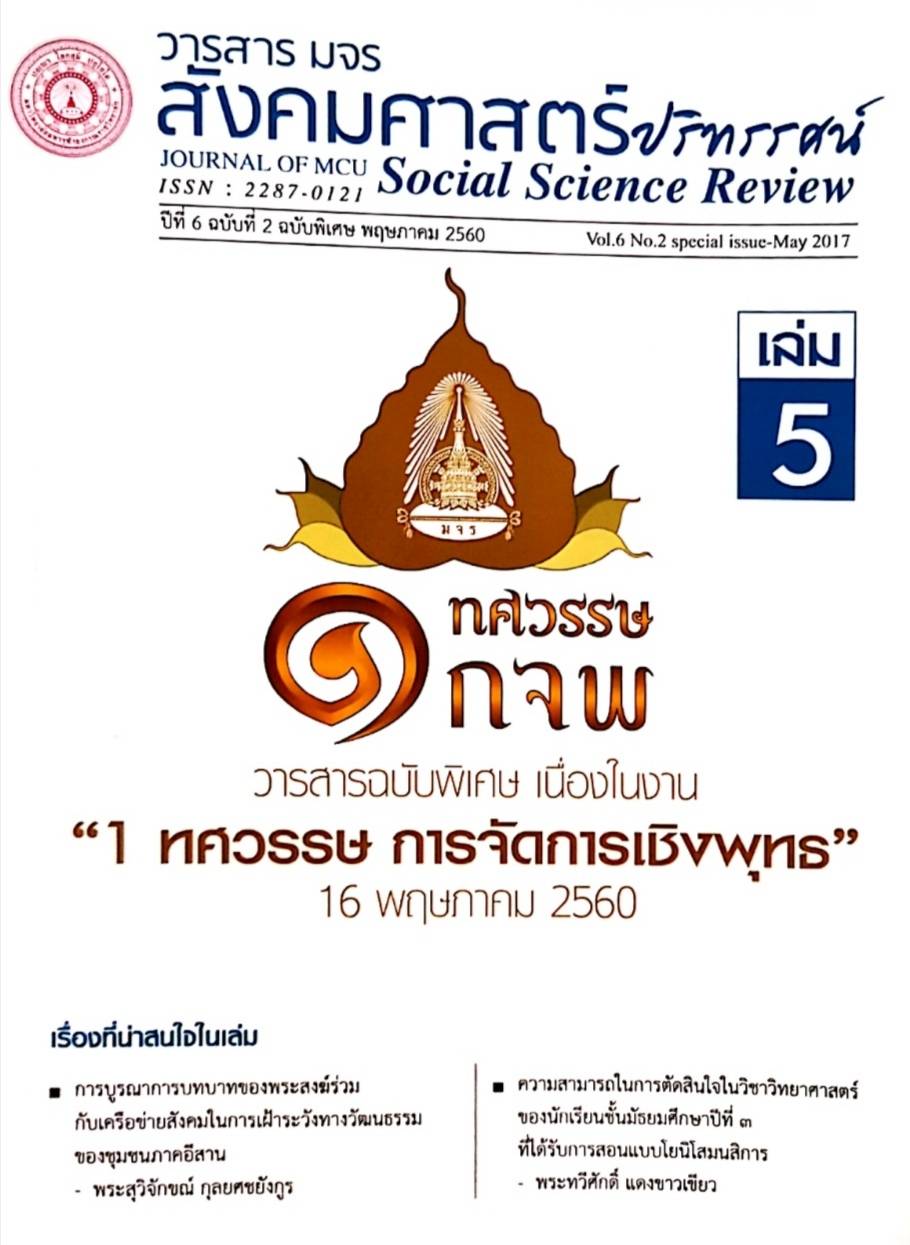หลักพุทธธรรมในการส่งเสริมพฤติกรรมการบริโภคอาหาร ของผู้สูงอายุในเขตกรุงเทพมหานคร
คำสำคัญ:
การส่งเสริม, การบริโภค, ผู้สูงอายุบทคัดย่อ
การศึกษาวิจัยเรื่อง หลักพุทธธรรมในการส่งเสริมพฤติกรรมการบริโภคอาหารของผู้สูงอายุในเขตกรุงเทพมหานคร มีวัตถุประสงค์ 1) เพื่อศึกษาหลักพุทธธรรมที่ส่งเสริมการบริโภคอาหาร 2) เพื่อเปรียบเทียบพฤติกรรมการบริโภคอาหารของผู้สูงอายุในเขตกรุงเทพมหานคร 3) เพื่อเสนอแนวทางการแก้ไขพฤติกรรมการบริโภคอาหารตามหลักพุทธธรรม ใช้รูปแบบการวิจัยแบบผสมผสาน (Mixed Methods Research) โดยการวิจัยเชิงปริมาณ ใช้การวิจัยเชิงสำรวจ กลุ่มตัวอย่างที่ใช้ในการวิจัย คือ ผู้สูงอายุที่เป็นสมาชิกในชมรมผู้สูงอายุเขตกรุงเทพมหานคร ได้แก่ ชมรมผู้สูงอายุข้าราชการกทม. และชมรมผู้สูงอายุโรงพยาบาลราชพิพัฒน์จานวน 291 คน จากจานวนประชากร 1,065 คน ซึ่งใช้วิธีการสุ่มตัวอย่างแบบบังเอิญ (Accidental sampling) เครื่องมือที่ใช้ในการเก็บรวบรวมข้อมูลเป็นแบบสอบถาม วิเคราะห์ข้อมูลโดยใช้โปรแกรมสำเร็จรูปเพื่อการวิจัยทางสังคมศาสตร์ สถิติที่ใช้วิเคราะห์ข้อมูลทั่วไปของประชากร คือ ค่าความถี่ ค่าร้อยละ สถิติที่ใช้วิเคราะห์ระดับพฤติกรรมการบริโภคอาหารของผู้สูงอายุในเขตกรุงเทพมหานคร คือ ค่าความถี่ (Frequencies) ร้อยละค่าเฉลี่ย (Mean) ค่าส่วนเบี่ยงเบนมาตรฐาน (Standard Deviation) และทดสอบสมมติฐานเพื่อบรรยายข้อมูลปัจจัยส่วนบุคคลของผู้ตอบแบบสอบถาม การทดสอบค่าที (t-test) เพื่อทดสอบความแตกต่างระหว่างค่าเฉลี่ยสองกลุ่ม และการทดสอบค่าเอฟ (F-test) ด้วยวิธีการวิเคราะห์ความแปรปรวนทางเดียว (One Way ANOVA) เพื่อทดสอบความแตกต่างระหว่างค่าเฉลี่ยตั้งแต่สามกลุ่มขึ้นไป และทดสอบความแตกต่างของค่าเฉลี่ยเป็นรายคู่ด้วยวิธีผลต่างนัยสำคัญน้อยที่สุด (Least Significant Difference : LSD) และการวิจัยเชิงคุณภาพ ใช้การสัมภาษณ์เชิงลึกกับผู้ให้ข้อมูลสำคัญ (In-Depth Interview) โดยใช้เทคนิคการวิเคราะห์เนื้อหาประกอบบริบท ผลการวิจัยพบว่า ระดับพฤติกรรมการบริโภคอาหารของผู้สูงอายุในเขตกรุงเทพมหานครโดยภาพรวมอยู่ในระดับปานกลาง (x=3.08) เมื่อพิจารณาเป็นรายด้าน พบว่า อยู่ในระดับปานกลางทุกด้าน การเปรียบเทียบพฤติกรรมการบริโภคอาหารของผู้สูงอายุในเขตกรุงเทพมหานคร จำแนกตามปัจจัยส่วนบุคคลของผู้ตอบแบบสอบถาม ได้แก่ เพศ อาชีพหลักก่อนเกษียณ รายได้เฉลี่ยต่อเดือน การพักอาศัย ปัญหาด้านสุขภาพ การออกกาลังกาย และการเข้าวัดทาบุญที่ต่างกัน มีพฤติกรรมการบริโภคอาหารของผู้สูงอายุในเขตกรุงเทพมหานครแตกต่างกัน อย่างมีนัยสำคัญทางสถิติที่ระดับ 0.05 ปัญหาอุปสรรค มีดังนี้ 1) ผู้สูงอายุมีนิสัยชอบบริโภคอาหารตามใจปาก มีความรู้เกี่ยวกับผลกระทบจากการบริโภคอาหารประเภทเนื้อสัตว์ และโรคภัยต่าง ๆ 2) ผู้สูงอายุเชื่อคาเชิญชวนและคล้อยตามคาโฆษณาสินค้าจากสื่อต่าง ๆ เช่น โทรทัศน์ วิทยุ เป็นต้น และอยากทดลองสินค้าตามคาโฆษณา 3) ผู้สูงอายุชอบเลือกซื้ออาหารปรุงสำเร็จรูปรับประทานเอง เพราะสะดวกสบาย ไม่เป็นภาระของบุตรหลาน ผลเสียต่อสุขภาพ คือ ทาให้กระดูกผุ กร่อน ไม่แข็งแรง มีอาการปวดตามข้อ ปวดตามกระดูก ปวดเมื่อยตามตัว 4) ผู้สูงอายุส่วนใหญ่อยู่บ้านตามลาพัง ทาให้เกิดอาการโรคซึมเศร้า เหงา ต้องการเพื่อนและคนพูดคุยที่รู้ใจพูดคุยสนทนาเรื่องทั่วไป แนวทางการแก้ไขและการส่งเสริมพฤติกรรมการบริโภคอาหารตามหลักพุทธธรรม มีดังนี้ 1) ใช้วิธีการพิจารณาปัจจยปัจจเวกขณะ บริโภคอาหารตามความเหมะสม พอประมาณ ไม่ให้ยึดติดในรสชาติอาหาร (รสตัณหา) ไม่ยึดกลิ่นของอาหาร (คันธตัณหา) การบริโภคอาหารเพียงเพื่อคลายเวทนา คือ ความทุกข์ ความหิวเป็นโรคที่ร้ายแรงที่สุด (ชิฆจฺฉา ปรมา โรคา) 2) ใช้วิธีการพิจารณาตามหลักกาลามสูตร ไม่เชื่อคาเชิญชวนหรือคาโฆษณา (มา อนสฺสเวน) ใช้ปัญญาพิจารณาโดยแยบคายก่อนบริโภคอาหาร 3) ใช้วิธีการสารวมอินทร์ (อินทรียสังวร) ทั้ง 6 คือ ตา หู จมูก ลิ้น กาย และใจ ไม่ยินดียินร้ายในเวลาเห็นรูปร่างหน้าตาของอาหารเมนูต่าง ๆ เป็นต้น 4) ใช้วิธีการพูดคุยสนทนา (ธมฺมสากจฺฉา) และจัดกิจกรรมสาหรับคนในครอบครัวร่วมกับผู้สูงอายุ (กลฺยณมิตฺตตา) เช่น นั่งพูดคุยสนทนาเรื่องทั่วไป ร้องเพลง เล่นดนตรี ออกกาลังกาย หรือออกไปเที่ยวนอกบ้านร่วมกัน เป็นต้น 5) ส่งเสริมกิจกรรมการลดการบริโภคอาหารของผู้สูงอายุ เช่น การบวชเนกขัมมะ รักษาอุโบสถศีล ทาให้ร่างกายของผู้สูงอายุปรับธาตุในร่างกายให้สมดุลจากการลดบริโภคอาหารมื้อเย็น
เอกสารอ้างอิง
บรรลุ ศิริพานิช. “บริการสุขภาพผู้สูงอายุ”, แพทยสภาสาร. ปีที่ 10 ฉบับที่ 9 (กันยายน 2525): 48.
พระธรรมปิฎก (ป.อ.ปยุตฺโต). (2539). ธรรมกับการศึกษาของไทย. กรุงเทพมหานคร: มูลนิธิพุทธธรรม. สำนักส่งเสริมและพิทักษ์ผู้สูงอายุ. (2556). รายงานประจาปี สถานการณ์ผู้สูงอายุไทย พ.ศ. 2555. กรุงเทพมหานคร: บริษัท เอสเอส พลัส มีเดีย จำกัด.
Lazarus, R.S. and S.Folkman. (1984). Stress Appraisal and Coping. New York: Spring Publishing Company.
ดาวน์โหลด
เผยแพร่แล้ว
รูปแบบการอ้างอิง
ฉบับ
ประเภทบทความ
สัญญาอนุญาต
ลิขสิทธิ์ (c) 2020 วารสาร มจร สังคมศาสตร์ปริทรรศน์

อนุญาตภายใต้เงื่อนไข Creative Commons Attribution-NonCommercial-NoDerivatives 4.0 International License.
เพื่อให้เป็นไปตามกฎหมายลิขสิทธิ์ ผู้นิพนธ์ทุกท่านต้องลงลายมือชื่อในแบบฟอร์มใบมอบลิขสิทธิ์บทความให้แก่วารสารฯ พร้อมกับบทความต้นฉบับที่ได้แก้ไขครั้งสุดท้าย นอกจากนี้ ผู้นิพนธ์ทุกท่านต้องยืนยันว่าบทความต้นฉบับที่ส่งมาตีพิมพ์นั้น ได้ส่งมาตีพิมพ์เฉพาะในวารสาร มจร สังคมศาสตร์ปริทรรศน์ เพียงแห่งเดียวเท่านั้น หากมีการใช้ภาพหรือตารางหรือเนื้อหาอื่นๆ ของผู้นิพนธ์อื่นที่ปรากฏในสิ่งตีพิมพ์อื่นมาแล้ว ผู้นิพนธ์ต้องขออนุญาตเจ้าของลิขสิทธิ์ก่อน พร้อมทั้งแสดงหนังสือที่ได้รับการยินยอมต่อบรรณาธิการ ก่อนที่บทความจะได้รับการตีพิมพ์ หากไม่เป็นไปตามข้อกำหนดเบื้องต้น ทางวารสารจะถอดบทความของท่านออกโดยไม่มีข้อยกเว้นใดๆ ทั้งสิ้น





